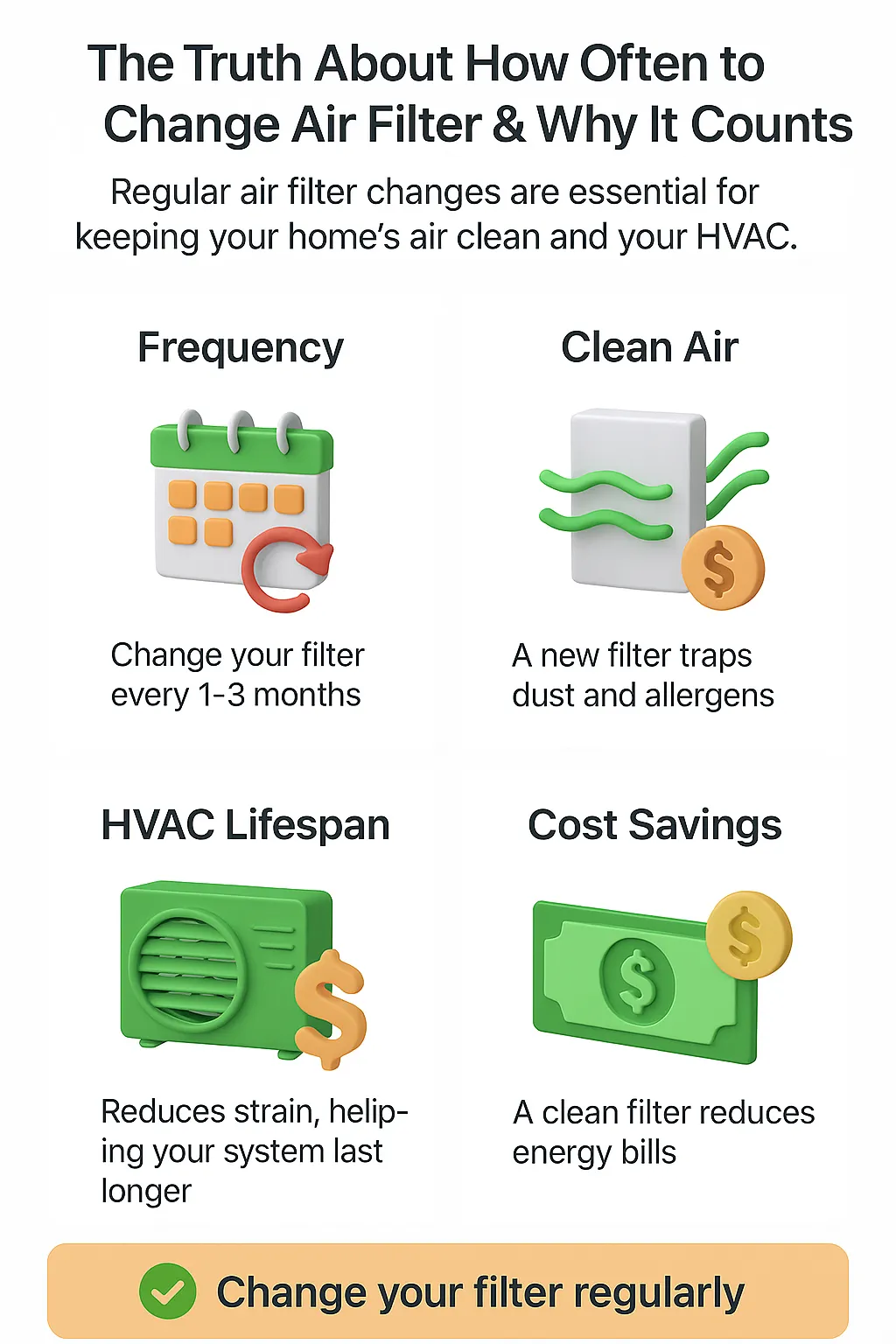This article breaks down how often you really need to change your air filter and why that schedule can make a meaningful difference in your home’s comfort, health, and cost-efficiency.
Key Takeaways
Late filter changes reduce airflow and HVAC performance.
Homes with pets, allergies, or indoor smoking need more frequent replacements.
Dirty filters increase energy use by up to 20%.
Clean filters save money and improve air quality year-round.
A small change can prevent expensive system repairs.
Why Timing Matters for Your Air Filter
Ignoring your air filter’s condition may seem harmless, but it often leads to bigger issues. A clogged filter forces your HVAC system to overwork, straining internal components and driving up your utility bills. Worse, it recirculates dust, dander, and pollutants that can affect your health.
So, how often should you change your filter?
Every 30–45 days if you have pets or allergies
Every 90 days in an average household with no pets
Every 6–12 months for vacation homes or low-traffic systems
These timeframes aren’t marketing fluff—they’re supported by years of HVAC service data and firsthand experience.
What HVAC Professionals Say
"One of the most common problems I see is overdue filter changes. It might seem like a small thing, but over time, it can lead to major repair costs and poor air quality. A fresh filter every 30 to 90 days makes a world of difference."
Real-Life Lessons From the Field
Example 1: The Cost of Forgetting
A family in Florida, with two dogs, neglected to change their filter for over six months. During peak summer, the HVAC unit failed. Diagnosis: restricted airflow caused the blower motor to overheat and burn out. Total repair cost: $900. It could have been avoided with a $10 filter change every 30–45 days.
Example 2: Breathing Easier on a Budget
In Los Angeles, a renter suffering from allergy flare-ups switched to a MERV 13 filter and began replacing it every 45 days. Within two weeks, their symptoms improved significantly—without changing anything else in the home.
Observations from Over 500 Homes
Technicians have consistently found:
Homes with pets or smokers need new filters every 30 days
Allergy-prone households benefit from 30–45 day replacements
Light-use systems in part-time homes can stretch to 6–12 months
Standard advice is often too generic—filter schedules should be customized to each home’s environment
The Data Behind the Recommendation
Dirty filters can drive up energy usage by as much as 20% (energy.gov)
Clean filters can reduce cooling costs by 5–15% annually
EPA studies show most indoor air pollution comes from within the home, not outdoors (epa.gov)
The CDC recommends regular filter maintenance in public institutions like schools to control airborne illness spread (cdc.gov)
These stats reinforce what HVAC experts already know: proper filter care supports both health and efficiency.
Final Thought: A Small Task With Big Payoff
We’ve seen it firsthand—neglecting your air filter can cost you. Physically, financially, and environmentally. But the good news is, the solution is simple: build a habit around your filter schedule.
Aligning your replacement timeline with your home’s conditions—pets, allergies, smoker presence, occupancy—will save you hundreds and significantly improve your indoor comfort.
The truth is, changing your air filter is not just routine maintenance. It’s preventive care for your home and your health.
What You Can Do Today
Pull out your filter and check it—if it looks dusty or discolored, replace it.
Follow this schedule:
Pets or allergies: every 30–45 days
Standard home: every 90 days
Low-use system: every 6–12 months
Purchase high-quality filters in bulk to stay prepared.
Use calendar reminders or apps to stay consistent.
Track your replacements on a checklist for easy monitoring.

Frequently Asked Questions
How often should I change my air filter to keep my HVAC running efficiently?
For most homes, every 90 days is ideal. If you have pets, allergies, or smokers in the home, change it every 30–45 days. Low-use systems (like vacation homes) may last 6–12 months between changes.
What happens if I don’t change my air filter on time?
A clogged air filter restricts airflow, making your HVAC system work harder. This leads to increased energy bills, wear and tear, overheating, and even complete system failure over time.
How can I tell when my air filter needs replacing?
Check for dust buildup, gray discoloration, airflow issues, allergy flare-ups, or increased energy usage. If you can’t see light through the filter when held up, it’s time to change it.
Do better filters mean I don’t have to change them as often?
Not necessarily. High-efficiency filters (with higher MERV ratings) capture more particles, which means they may clog faster. Always follow manufacturer recommendations and inspect monthly.
Can regular air filter changes really improve air quality?
Yes. Clean filters trap allergens, pet dander, dust, and airborne pollutants, leading to noticeably fresher air—especially helpful for allergy sufferers or asthma-prone households.
Understanding The Truth About How Often to Change Air Filter & Why It Counts can be the difference between a healthy, efficient HVAC system and one that silently drives up your energy bills while circulating allergens. Routine filter replacement not only enhances indoor air quality but also supports long-term savings. Much like how consistent support can uplift broader communities, learning How to Support Black-Owned Businesses and Close the Racial Wealth Gap emphasizes the value of regular, thoughtful action. Additionally, insights from How Many Black-Owned Businesses reveal how community involvement and consistent practices—whether in economic choices or home maintenance—play a role in collective well-being. Just as supporting equity requires awareness and intent, maintaining air filters on the right schedule ensures cleaner air and greater system resilience.